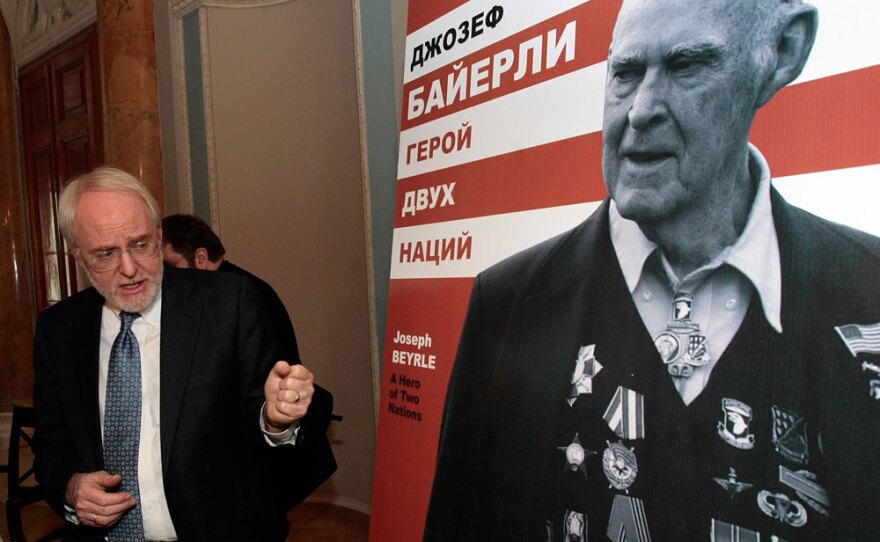The Central Museum of the Great Patriotic War is dedicated to the Soviet victory in World War II. But on a recent afternoon, American military musicians made up half the band playing the national anthem at the opening of an exhibit telling the story of Joseph Beyrle, one of the few men to fight the Nazis in both the U.S. and Russian armies.
"A Hero of Two Countries" recalls how, 65 years ago, the American paratrooper escaped from a German POW camp and joined the Red Army, serving in a tank regiment.
"We took off and run through the scrub pines and then the guard opened up and the two guys who escaped with me were killed and I made it to the stream and I went downstream because they turned the dogs loose at that time," he said in an interview recorded before his death in 2004.
Parachuted into France in 1944, he spent six months in a German prison camp before he escaped. A week later, he found a Soviet tank regiment. The only Russian he knew was "Amerikansky tovarishch" (American comrade), but the political commissar spoke a bit of English, and it was enough.
"I told him I was an American escaped prisoner of war, and I wanted to go with them and defeat Hitler, and he says 'No,' that I couldn't do it," Beyrle recalled in the interview. "Then the battalion commander came up and he explained to her ... and she says, 'Da, da' (Yes, yes)."
Beyrle was soon wounded in the fierce fighting on the eastern front and found himself in a Soviet military hospital, with no papers and little hope of returning home. But then he met one of the Soviet Union's top generals.
"Marshal Zhukov visited the hospital and he came to my bed and through an interpreter wanted to know my name and how I got there. And the last thing he said, 'Is there anything I can do for you?' "
Beyrle told the general he didn't have any identification to prove he was an American.
"He didn't say anything," Beyrle recalled. "The next day the interpreter came back and handed me an envelope, a letter all in Russian." Beyrle didn't know what it said.
"You don't need to know what it says," the interpreter told Beyrle. "That'll get you anyplace you want to go."
The letter got him to the U.S. Embassy in Moscow, and then back home to Michigan. Beyrle settled down and had a family. It was years later when his son John first went to Moscow as part of a U.S. government delegation that the whole story came out.
"I teased a bit more of that story out of him and we eventually found out enough to get him a visa to come here in 1979, and he actually met with the Soviet veterans of the war committee," John Beyrle said.
Joseph Beyrle became a symbol of U.S.-Soviet detente, ending up with a chest full of medals from both sides and becoming known in Russia as the "hero of two nations." In the final twist to the story, Joseph's son John is now the U.S. ambassador to Moscow.
"My father's story, the fact that he fought with the Red Army, even for a short time at the end of the war, has opened a lot of doors for me," John Beyrle says. "It gives me a much stronger basis to make that appeal to Russian people, many of whom are still very suspicious about the United States."
Copyright 2022 NPR. To see more, visit https://www.npr.org. 9(MDAzMjM2NDYzMDEyMzc1Njk5NjAxNzY3OQ001))






